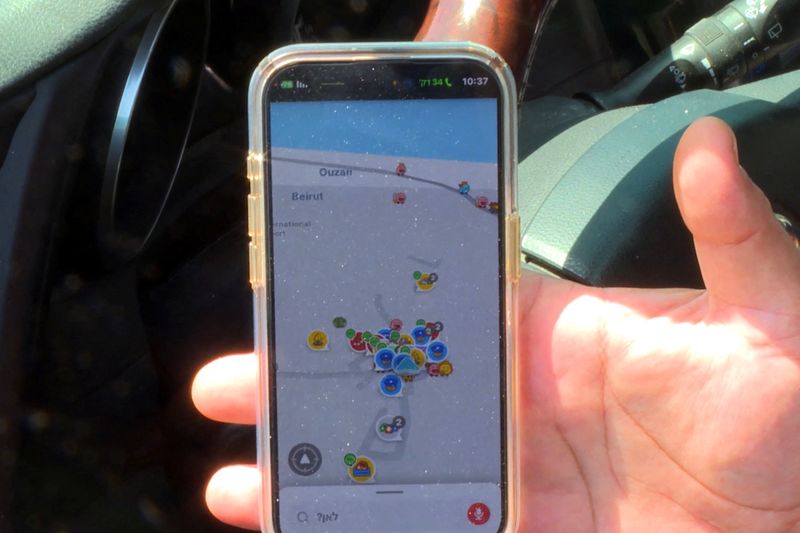JERUSALEM (Reuters) -Israel braced on Thursday for the possibility of a retaliatory attack after its suspected killing of Iranian generals in Damascus this week, and Prime Minister Benjamin Netanyahu said the country would harm "whoever harms us or plans to harm us."
His comments came after Israel's armed forces - stretched by nearly six months of war in the Gaza Strip and on the Lebanese front - announced they were suspending leave for all combat units, a day after they said they were mobilising more troops for air defence units.
The possibility of Iran retaliating for Monday's presumed Israeli air strike on Iran's embassy compound in Damascus has raised the spectre of a wider war, though two Iranian sources said Tehran's response would be calibrated to avoid escalation.
"For years, Iran has been acting against us both directly and via its proxies; therefore, Israel is acting against Iran and its proxies, defensively and offensively," Netanyahu said at the start of a security cabinet meeting late on Thursday.
"We will know how to defend ourselves and we will act according to the simple principle of whoever harms us or plans to harm us, we will harm them," he said.
The White House said U.S. President Joe Biden spoke with Netanyahu and they discussed Iran's threats. Biden made clear that the United States strongly supports Israel in the face of that threat, Washington said.
Reuters journalists and residents of Israel's commercial hub Tel Aviv said GPS services had been disrupted, an apparent measure to help ward off guided missiles.
Iran, Israel's arch-enemy, has sworn revenge for the killing of two of its generals along with five military advisers in an air strike on an Iranian diplomatic compound in the Syrian capital on Monday.
Israel is believed to have carried out the strike, among the most significant yet on Iranian interests in Tehran's close ally Syria. Israel has neither confirmed nor denied involvement. Netanyahu made no mention of the attack.
Israel has been pressing its war on Hamas in Gaza since the Palestinian Islamists led a cross-border killing and kidnapping spree on Oct. 7, and has also been trading fire almost daily with Iran-backed Hezbollah in Lebanon.
Yemen's Houthi rebels, which are aligned with Tehran, have launched occasional long-range rockets at Israel's Eilat port.
CAUTIOUS IRAN?
Until now, Iran has avoided directly entering the fray, while supporting allies' attacks on Israeli and U.S. targets.
The Islamic Republic has several options. It could unleash its heavily armed proxies in Syria and Iraq on U.S. forces, use Hezbollah to hit Israel directly or ramp up its uranium enrichment program. That would raise concern among the United States and its allies about Tehran's potential to make a nuclear bomb, which the West has long sought to curb.
But many diplomats and analysts say Iran's clerical elite does not want an all-out war with Israel or the U.S. that might endanger its grip on power, and would prefer to keep using proxies to carry out selective tactical attacks on its foes.
Such proxy strikes on U.S. forces in the region ceased in February after Washington retaliated for the killing of three U.S. soldiers in Jordan with dozens of air strikes on targets in Syria and Iraq linked to Iran's Revolutionary Guards Corps and militias it supports.
U.S. officials said at midweek they had not yet picked up intelligence suggesting Iran-backed groups were looking to target U.S. troops following Monday's attack.
While mindful that Israeli strikes on regional adversaries can put U.S. soldiers at risk of retaliation, U.S. officials are sympathetic to Israel's desire to restore deterrence after Oct. 7 and to stop flows of arms and fighters that may threaten it.
One U.S. official, speaking on condition of anonymity, said there was a growing concern Iran would make good on its threats to retaliate, raising the risk of volatile, regional escalation.
Iranian leaders have publicly indicated that Iran, which has deep-seated economic problems wrought in part by U.S. sanctions and took months to put down recent popular unrest, does not want a big war that could destabilise the country.
Amos Yadlin, a former Israeli intelligence chief, said Iran might choose Friday - the last in the Holy Muslim month of Ramadan and Iranian Quds (Jerusalem) Day - to respond to the Damascus strike, either directly or through a proxy.

"I will not be surprised if Iran will act tomorrow. Don't panic. Don't run to the shelters," said Yadlin, now at the Kennedy School's Belfer Center at Harvard University, citing Israel's aerial defence systems.
"Be tuned for tomorrow and then, depending on the consequences of the attack, it may escalate."
